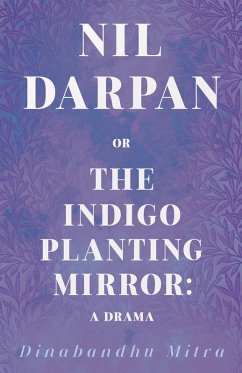
Nil Darpan; or, The Indigo Planting Mirror, A Drama (eBook, ePUB)
Translated from the Bengali by a Native
Übersetzer: Dutt, Michael Madhusudan

PAYBACK Punkte
0 °P sammeln!
In "Nil Darpan; or, The Indigo Planting Mirror, A Drama," Dinabandhu Mitra utilizes the powerful medium of drama to illuminate the grim realities faced by indigo farmers in colonial Bengal. Written in the vernacular Bengali, Mitra's work employs a vivid and poignant style that integrates lyrical prose with sharp dialogue, reflecting the social injustices of the time. Contextually situated within the Bengal Renaissance, this play critiques the exploitative indigo plantation system imposed by British colonial powers, making it not only a literary piece but also an essential historical document t...
In "Nil Darpan; or, The Indigo Planting Mirror, A Drama," Dinabandhu Mitra utilizes the powerful medium of drama to illuminate the grim realities faced by indigo farmers in colonial Bengal. Written in the vernacular Bengali, Mitra's work employs a vivid and poignant style that integrates lyrical prose with sharp dialogue, reflecting the social injustices of the time. Contextually situated within the Bengal Renaissance, this play critiques the exploitative indigo plantation system imposed by British colonial powers, making it not only a literary piece but also an essential historical document that offers insight into the socio-political struggles of the era. Dinabandhu Mitra was deeply influenced by the socio-economic hardships of rural Bengal, as well as the burgeoning nationalist sentiments of the 19th century. His background as a Bengali intellectual and his active involvement in social reform likely informed his commitment to portraying the plight of the agrarian class. This work marks a significant contribution to Bengali literature, bridging art and activism, and serves as a testament to Mitra's dedication to raising awareness about colonial exploitation. Recommended for readers interested in postcolonial literature, social justice, and historical dramas, "Nil Darpan" is not only a compelling narrative but also a call to awareness. It invites readers to engage with the historical context of colonialism while resonating with contemporary themes of oppression and resistance, ensuring its relevance in today's discourse.
Dieser Download kann aus rechtlichen Gründen nur mit Rechnungsadresse in A, B, BG, CY, CZ, D, DK, EW, E, FIN, F, GR, H, IRL, I, LT, L, LR, M, NL, PL, P, R, S, SLO, SK ausgeliefert werden.













